PEN eNews 7(5) April 2018
PEN
® eNews is a monthly e-newsletter shared with the global PEN Community and created to help dietitians position themselves as leaders in evidence-based nutrition practice. In addition, users of the PEN System will find articles on the new evidence, resources and features available and how to maximize one's use of PEN.

The greatest enemy of knowledge is not ignorance, it is the illusion of knowledge
attributed to Stephen Hawking and Daniel J Boorstin
Last month the world lost a science legend with the passing of Stephen Hawking. An extraordinarily curious man, he  sought answers to some of the really big questions of our time. He was obviously a brilliant thinker and reflecting on his life and accomplishments reminded me of an interesting blog I read a couple of years ago about how we, as humans, think and process or make sense of information and some of the flaws in the process.
sought answers to some of the really big questions of our time. He was obviously a brilliant thinker and reflecting on his life and accomplishments reminded me of an interesting blog I read a couple of years ago about how we, as humans, think and process or make sense of information and some of the flaws in the process.
I became aware of the Cognitive Bias Codex in a blogpost by Buster Benson. Using the 175 biases listed on Wikipedia, he organized them by what problem the bias or flaw in our thinking processes were attempting to address. (Full disclosure – I liked his approach to organizing cognitive biases so much I purchased the poster and have in hanging in my office!)
- Too much information – to deal with the information overload our brain filters most information out and retains other bits that might be useful. However, this means we may be more apt to notice things that have been repeated often or are funny or bizarre, we recall and build on information we just read, and we are drawn to results or stories that confirm our existing beliefs.
- Not enough meaning – we take this filtered information and see patterns and fill in gaps with what we think we know to “update our mental models of the world” (1). Some ways we tend to deal with this is that we tend to see patterns where none exist, we rely on stereotypes and generalities, and we simplify mathematical probabilities to predict if something will happen.
- We need to act fast – it is likely a survival instinct that requires that we take new information and make quick decisions and use the new information to anticipate the future. As a result, we may choose the simple or less risky option rather than the best option.
- What should we remember? – There is too much information coming at us and so we must constantly make decisions about what to remember and what to let go. In the process we reinforce some memories and edit them incorrectly over time; we drop specifics and formulate generalities and whether we remember something may not be based on how important it is but rather what was going on or how we were feeling at the time.
Benson goes on to suggest that our cognitive solutions create the following issues:
- We sometimes filter out important information
- Our assumptions can create context or imagined details that lead to faulty conclusions
- Some of our quick decisions can be unfair and self-serving
- Our memory can be faulty and self-serving and can reinforce the errors in our thinking.
Do read the full blog as it is full of great examples and links to descriptions of the various cognitive biases.
Researchers are also subject to bias. David Sackett, another brilliant thinker and a giant in the field of evidence-based practice published a “catalog of biases which may distort the design, execution, analysis and interpretation of research” (2). As a tribute to David Sackett, the Catalog of Biases Collaboration (supported by the Centre for Evidence-based Medicine at the University of Oxford) has created an online resource that describes the particular biases encountered in research, provides examples, discusses the impact of the bias and suggests research methods or steps that can be taken to prevent or reduce the impact of the bias. https://catalogofbias.org/
To give you a taste, here are two biases from the Catalog of Bias that caught my eye.
Hot stuff bias: “When a topic is fashionable (“hot”) investigators may be less critical in their approach to their research, and investigators and editors may not be able to resist the temptation to publish the results.” They go on to cite examples such as use of statins or HRT – I wonder if vitamin D or ketogenic diets might fit the hot stuff bias definition in the nutrition world these days.
One-sided reference bias: “When authors restrict their references to only those works that support their position.” Also known as “cherry-picking” it can lead to a false sense of the body of knowledge on a particular topic and is why transparency regarding search strategies is so important. See How do I...Find Search Strategies in PEN?
The issues of too much information, not enough information, our need to act fast and rely on our faulty memory will always be with us. Being aware of how we deal with these issues and finding tools and strategies to address them, can help us be better thinkers, problem-solvers and decision makers.
In this issue of PEN eNews 7(5), we:
- Visit Mexico
- Debate nutrition labelling
- Learn about the new PEN feature: search strategies
- And most importantly, thank our many PEN volunteer authors and reviewers!
Enjoy PEN eNews 7(5)!
References:
- Cognitive Bias Cheat Sheet – Because thinking is hard. Better Humans Blog by Buster Benson. Sept 1, 2016. Available at: https://betterhumans.coach.me/cognitive-bias-cheat-sheet-55a472476b18
- Sackett DL. Bias in analytical research. Chron Dis 1979;32:51-63. Available at: http://www.jameslindlibrary.org/sackett-dl-1979/ (scroll down below the first page preview to access the entire article.
- Catalogue of Bias Collaboration, Aronson JK, Bankhead C, Nunan D. Hot stuff bias. In: Catalogue of Bias 2017. Available at: https://catalogofbias.org/biases/hot-stuff-bias/
- Catalogue of Bias Collaboration, Spencer EA, Brassey J, Heneghan C. One-sided reference bias. In: Catalogue of Bias 2017. Available at: https://www.catalogofbias.org/biases/one-sided-reference-bias
Written by:
Jayne Thirsk RD PhD FDC
Director PEN: Practice-based Evidence in Nutrition®
eNews@pennutrition.com
PEN
® eNews may contain links to other external websites.
PENnutrition.com is not responsible for the privacy practices or the content of such external websites. Neither Dietitians of Canada, nor any dietetic associations contributing to or licensing the content in Practice-based Evidence in Nutrition: PEN
® endorse the content, products or services on other websites.
PEN Goes to Mexico!
This March, members of the PEN Global Governance group met for their annual meeting in Monterrey Mexico.
 While the purpose of the meeting was to conduct strategic planning for the international PEN System for the year ahead, it was also an opportunity to meet with colleagues from Mexico who share a passion for evidence-based dietetic practice.
While the purpose of the meeting was to conduct strategic planning for the international PEN System for the year ahead, it was also an opportunity to meet with colleagues from Mexico who share a passion for evidence-based dietetic practice.
Our hosts were Dr. Manuel Lopez Cabanillas Lomeli, Director of the Facultad de Salud Publica y Nutricion (FaSPyN) of the Univesidad Autonoma de Nuevo Leon (UANL), Dra. Elizabeth Solis Perez Director, Centro de Incubacion de Empresas y Transferencia de Tecnologia of UANL, Maria Guadalupe Solís, Presidenta de la Junta de Honor del Colegio Mexicano de Nutriólogos and Dra. Edna Judith Nava González, Profesor-Investigator in the FaSPyN at UANL and President and Council Director of the Colegio Mexicano de Nutriólogos 2017-2019. Upon arrival, the PEN Global Governance group was treated to a tour of Monterrey and a fabulous dinner featuring regional cuisine.
The next day, we were welcomed to the UANL by Dr. Daniel González Spencer, Vice President of International Relations at UANL, following which, we met with about 100 faculty, staff and students from area universities and through a panel of presentations shared an international perspective of Building the Nutrition and Dietetics Profession for the Future.
- Future Dietitian 2025 – designing and leading the future Sue Kellie, British Dietetic Association
- Advancing Practice: Learning and Connecting Claire Hewat, Dietitians Association of Australia
- Dietitians CAN! Who are dietitians, what do they do and why do they matter Dr. Jayne Thirsk, Dietitians of Canada
- Dietitians as Knowledge Translation Leaders Dr. Judy Bauer, Dietitians Association of Australia
This was followed by an afternoon workshop demonstrating the Power of the PEN System delivered by Dr. Jayne Thirsk, Director of PEN: Practice-based Evidence in Nutrition.
There was tremendous interest in the PEN System by those in attendance and we look forward to welcoming Colegio Mexicano de Nutriólogos and Mexican universities training dietitian/nutritionists into the PEN Community. Our hosts prepared a lovely movie of the highlights of our time together and we invite you to view it here.
Written by:
Jayne Thirsk RD PhD FDC
Director PEN: Practice-based Evidence in Nutrition®
enews@pennutrition.com
How do I… find Search Strategies in PEN?
Behind the Scenes (and the Evidence) – The PEN Search Strategy
Do you ever read a Practice Question in PEN and wonder: What was the time period of the literature search? or Where did the author find the evidence? or Why wasn’t a specific article included?
One of the most critical parts of providing an evidence-based answer is conducting a literature review. To do a rigorous literature review, a search strategy is needed. Every PEN Practice Question begins with a search strategy. This search strategy tells reviewers and the PEN Team:
- what search terms were used
- what databases and grey literature sources (e.g. international guidelines) were searched
- what reviews or studies were excluded and why
- what is the time frame for the search.
This information has always been a valuable part of our internal files. Going forward, the PEN Team is adding Search Strategies to the PEN website for new and updated Practice Questions so that PEN users can review them. You can see the link to the Search Strategy underneath some Practice Question titles now, as in the example below.

When Search Strategy is clicked on, you will see the information used to conduct the search:
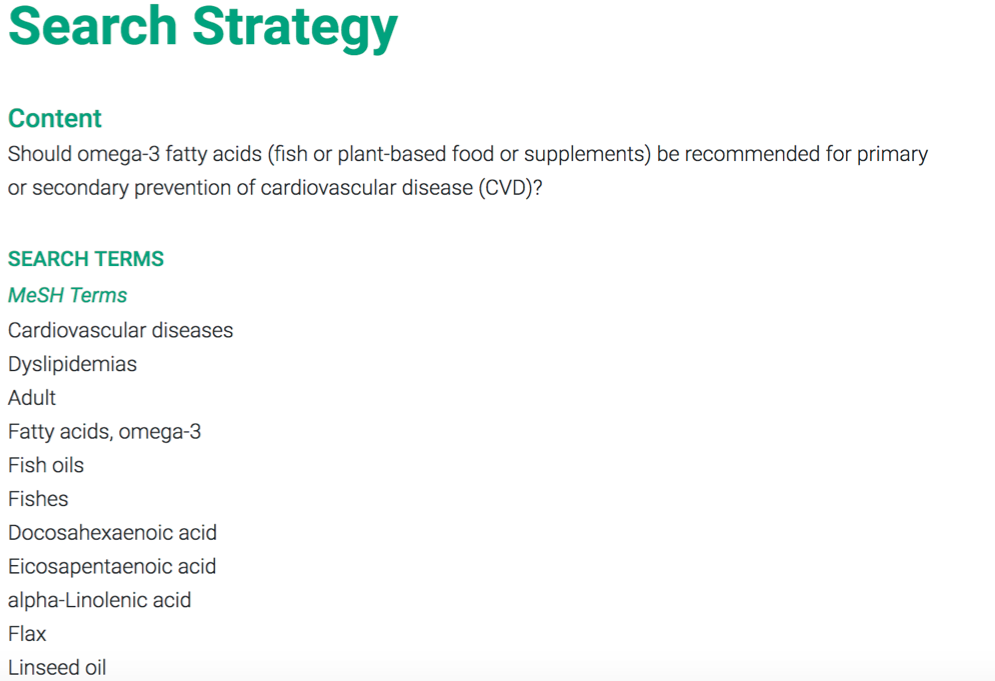
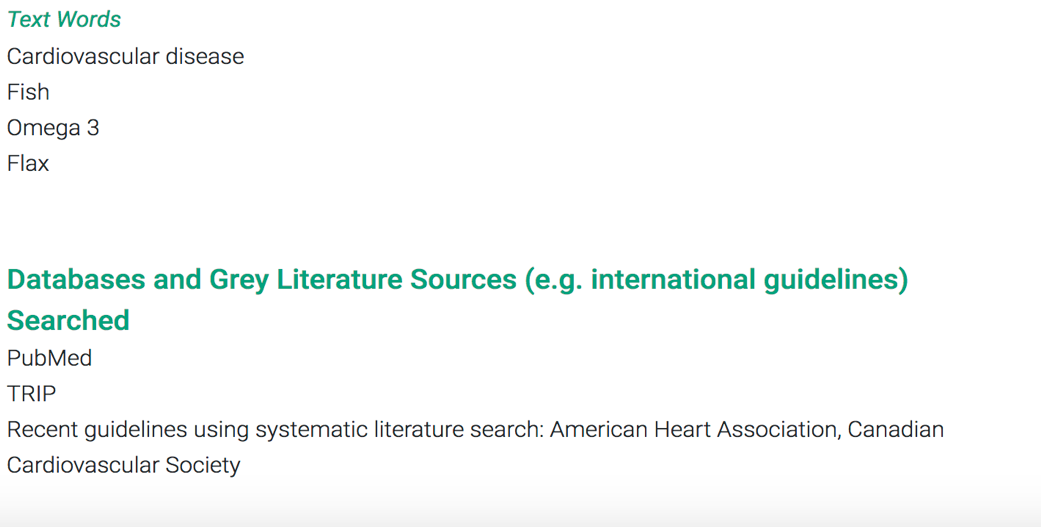
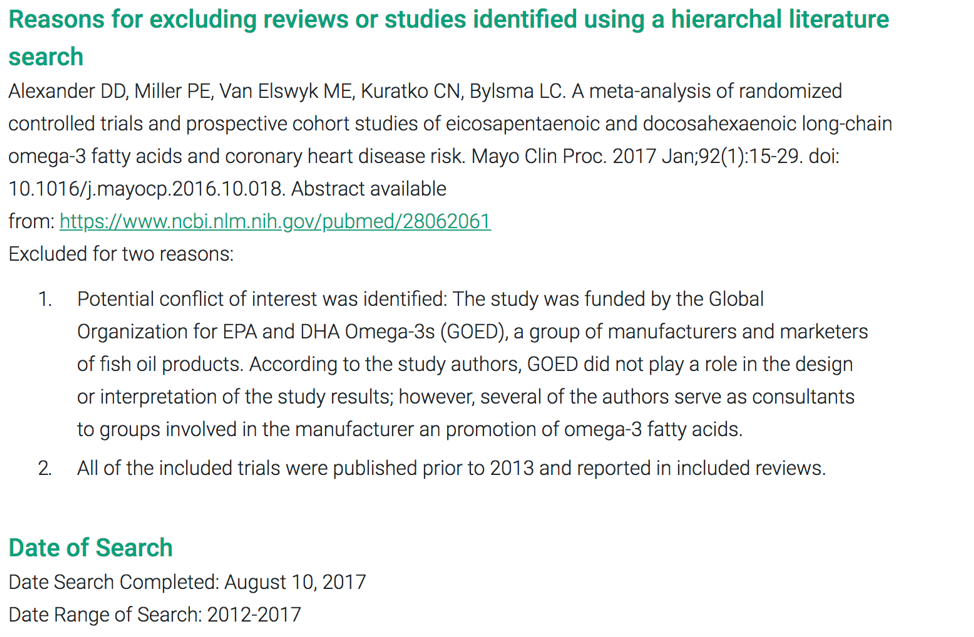
We hope you find this new resource helpful in your evidence-based work.
Submitted by:
Heather Alaverdy MA, RD
PEN® Editor
heather.alaverdy@dietitians.ca
Has the role of the nutrition label shifted?
In March, I was attending the British Dietetic Association’s annual conference in London, UK. With my research interest in nutrition labelling in mind, I listened to a representative of SpoonGuru address the audience of dietitians about their new app: technology which provides the consumer with a personalised list of available products based on their nutrition and health preferences.
That’s it, I thought. Consumers do not need to read nutrition label information again.
Nutrition information is now a familiar part of the food label. A printed collection of  numbers on food packaging, there to help consumers make informed choices about the foods they buy and eat. But has this actually had an effect on health? Obesity levels are not yet significantly lower. Recent data from the UK National Diet and Nutrition Survey shows the population are still eating more sugar and saturated fat than they should (1). Yet nutrition labels have become more sophisticated, and now include additional voluntary ‘front of pack’ nutrition signposting on an increasing number of products. Legislation on mandatory nutrition labelling has evolved further still. Nutrition information is now required for products in Europe and the UK, where it was already prevalent, and modifications to the US Nutrition Facts Panel will now promote sugar and calorie content (2,3).
numbers on food packaging, there to help consumers make informed choices about the foods they buy and eat. But has this actually had an effect on health? Obesity levels are not yet significantly lower. Recent data from the UK National Diet and Nutrition Survey shows the population are still eating more sugar and saturated fat than they should (1). Yet nutrition labels have become more sophisticated, and now include additional voluntary ‘front of pack’ nutrition signposting on an increasing number of products. Legislation on mandatory nutrition labelling has evolved further still. Nutrition information is now required for products in Europe and the UK, where it was already prevalent, and modifications to the US Nutrition Facts Panel will now promote sugar and calorie content (2,3).
Legislation still seems to believe in the nutrition label as a public health approach providing consumers with the means to choose a healthy diet. Yet research has shown that nutrition labels may not be equitable, with the motivated and knowledgeable ‘nutritional elite’ more likely to use them than other socio-demographics (4). It has also been shown that many types of consumers have difficulties using and interpreting complex numerical nutrition labelling (5). Consequently, nutrition labels may not be realistically useable by all consumers and therefore fail to impact on population health. Accordingly, research has struggled to find evidence of the effect of nutrition labels on consumers’ real-life food behaviours and purchases. That said, the expectation of enhanced labelling with legislation is great: with theoretical estimates on obesity reduction in Europe modelled between 2- 6.5% (6).
Independent of consumer use, nutrition labels are essential in many ways to support better dietary health. For example, nutrition information is needed by manufacturers who want to optimise specific nutrients or make health or nutrition claims about their products. Nutrition information also enables food industry recipe reformulation to change levels of key nutrients, which could result in positive changes to population nutrient intakes over time (7). Without nutrition labels, dietitians and nutritionists would not be able to compile food composition databases to undertake dietary intake assessment.
Perhaps we need to change our approach to nutrition labels and how they can improve dietary health. Advances in technology, including personalised ‘nutrition’ apps, can now be considered together with the research findings concerning how consumers really use nutrition label information in real-life. See PEN Food and Nutrition Labelling Knowledge Pathway for more on the growing research evidence base. Beyond the emphasis on legislation to drive the use of the nutrition information on the food label, it might just be time to rethink exactly how we, as dietitians, promote use of the nutrition information when aiming to improve our population’s dietary health.
References
- National Diet and Nutrition Survey. Results from Year 7 and 8 of the rolling programme. 2018. Accessed March 16, 2018. Available from: https://www.gov.uk/government/uploads
- Butriss J L. The role of nutritional labelling and signposting from a European perspective. Proceedings of the Nutrition Society. Conference on ‘Improving nutrition in metropolitan areas’ Symposium 5: The role of regulation to improve nutrition. 2018. P1.
- Food and Drug Administration (FDA): Change to the Nutrition Facts Label. Accessed March 24 2018. Available from: https://www.fda.gov/Food/GuidanceRegulation/GuidanceDocuments
- Nabec L. Improving dietary behaviour with nutrition labelling: Towards a research agenda that serves consumer wellbeing. Recherche et Application en Marketing. 2017. 1-27. Abstract available from: http://journals.sagepub.com/doi/abs/10.1177/2051570716685522
- Campos S, Doxey J, Hammond D. Nutrition Labels on pre-packaged foods: a systematic review. Public Health Nutr. 2011;14(8):1496-506. Abstract available from: https://www.ncbi.nlm.nih.gov/pubmed/21241532
- Storckdieck Gennannt Bonsman S, Willis JM. Nutrition Labelling to Prevent Obesity: Reviewing the Evidence from Europe. Curr Obes Rep. 2012;1(3):134-140. Abstract available from: https://www.ncbi.nlm.nih.gov/pubmed/22924157
- National Diet and Nutrition survey. New PHE Data on salt intake levels, 2016. Available from: https://www.gov.uk/government/news/new-phe-data-on-salt-consumption-levels
Submitted by:
Sally Moore BSc. (Hons.), MMedSci, RD, FHEA
Registered Dietitian and Researcher
England, UK
The PEN Team Bids a Fond Farewell to EatRight Ontario
Since it first opened its “doors” ten years ago, the EatRight Ontario (ERO) Dietitian Contact Centre has provided outstanding direct service to the public living in the province of Ontario, Canada, as well as support to health intermediaries providing nutrition services. The contact centre was established to provide expanded access to the trusted advice from dietitians. Using a special version of the PEN database (contact centre PEN or ccPEN) they provided evidence-based nutrition advice to literally millions of consumers and health intermediaries via phone, email or on their award-winning website. The ERO team produced hundreds of practical tools to help translate the science of nutrition into actionable steps to promote healthier eating. The PEN database is proud to host many of these outstanding resources and to make them available to PEN users. We congratulate all our colleagues at EatRight Ontario for a job well done.
Sadly, the government funding to support ERO has been directed elsewhere. We’ll miss you!
Take a moment to review their achievements in this EatRight Ontario Legacy Report.
Dietitians of Canada has heard from dietitians, health care professionals and the public that they value the consumer friendly, evidence-based content on the award-winning EatRightOntario website. Dietitians of Canada is pleased to be expanding this website under the new name of UnlockFood.ca. UnlockFood.ca will continue to be based on PEN evidence and help our audiences understand who dietitians are, what they do and why they matter. In addition to maintaining the nutrition and healthy eating content, the site will help the public to find a dietitian and understand how dietitians make a difference.

Written by:
Jayne Thirsk RD PhD FDC
Director PEN: Practice-based Evidence in Nutrition®
enews@pennutrition.com
"PEN® Trending Topics respond to media questions"
PEN® Insider
Spotlight on PEN® Trending Topics
Looking for a response for a hot topic, news-making evidence or the latest nutrition-related media story…. PEN® responds with Trending Topics.
It’s impossible to keep up with all of the nutrition-related stories in the news – even for PEN. PEN® team members scan the media for what’s hot and what’s not and we provide responses to those stories we think have an international interest for our international PEN® users and social media followers. In particular, topics which may have an impact on practice are chosen to provide an evidence-based response or opinion. There are in depth reviews of topics, shorter analyses of scientific papers and other information pieces in the Trending Topics family.
Some of the topics we have tackled lately:
And shorter pieces on:
There are several ways you can find out when a new Trending Topic has been posted:
- Click on the Trending Topics tab on the PEN® Home page
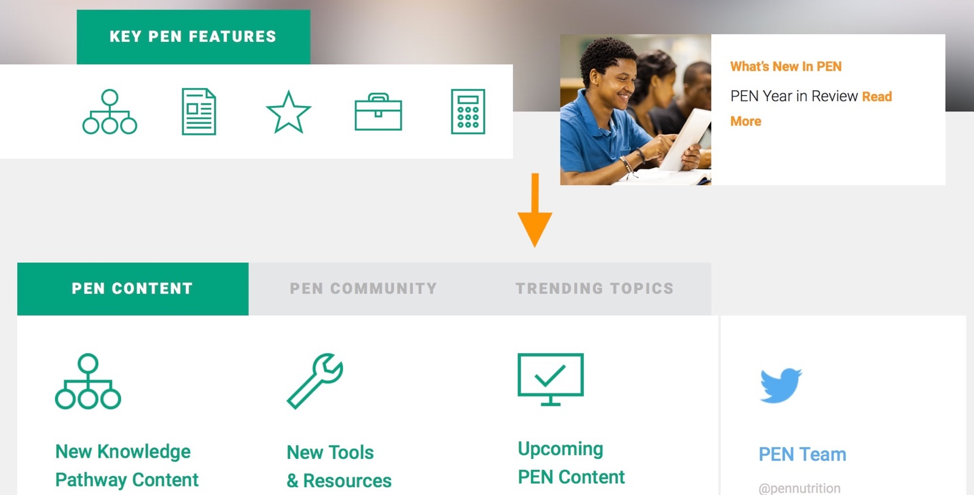
- DC Weekly – often Trending Topics items are the PEN® Editor’s Pick
- Add Trending Topics to your monthly PEN® Alerts – in an article in PEN eNews last year we described how to sign-up for Alerts to new PEN® content directly into your Inbox.
- Follow us on any of our social media platforms (Twitter, Facebook, LinkedIn, Instagram) where we promote new Trending Topics
If you are already familiar with Trending Topics please give us your feedback via our short, 3 minute, Trending Topics Survey on the PEN® Home page: https://www.pennutrition.com/Home.aspx
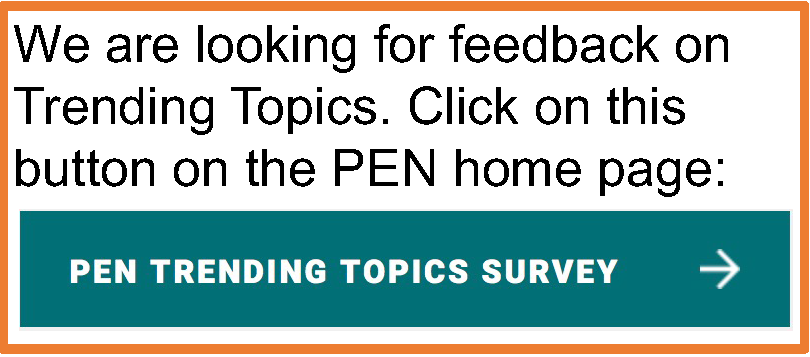
"Being a PEN® reviewier contributes to my professional portfolio"
PEN® Insider
Spotlight on How the PEN® System incorporates peer review
Dietitians around the world have similar practice-based questions and face similar challenges in trying to stay on top of emerging evidence and nutrition research. Peer review is an integral part of the PEN® content development processes. Peer review ensures that we are asking the right practice questions, and that the research is effectively translated into actionable and practical guidance.

Peer review occurs throughout the PEN® content development process:
- During question identification for new content and during the question verification stage of updating existing content peer reviewers from the three PEN partners – BDA, DAA and DC are invited to comment.
- During the review stage of PEN® content development including our practice questions, backgrounds and Trending Topics.
When practice questions are developed, we try to involve both academic experts and practitioners who will be using the information. PEN aims to address real issues faced in actual dietetic practice.
PEN supports its peer reviewers PEN has a PEN® Authors and Reviewers Guide, which includes tools and checklists to assist and standardize the peer review process (1). Included in the PEN® Authors and Reviewers Guide are guidelines to ensure peer reviewers are familiar with the criteria that authors have used to create their content. Similarly, authors are familiar with the criteria that their peers will use to review the PEN® content. Peer reviewers are asked to consider:
- Accuracy, clarity and conciseness of the content.
- Is the content comprehensive? Are any key issues missing in the response to the question?
- Is the content valid, will it make an important difference to practice? Will this information be applicable in practice settings?
- Are there any key references missing? Are the references included objective, current and inclusive?
Reviewers who have agreed to be listed as a reviewer in the PEN® System are recognized as peer reviewers in each practice question under the link: Pathway Contributors section of each knowledge pathway.
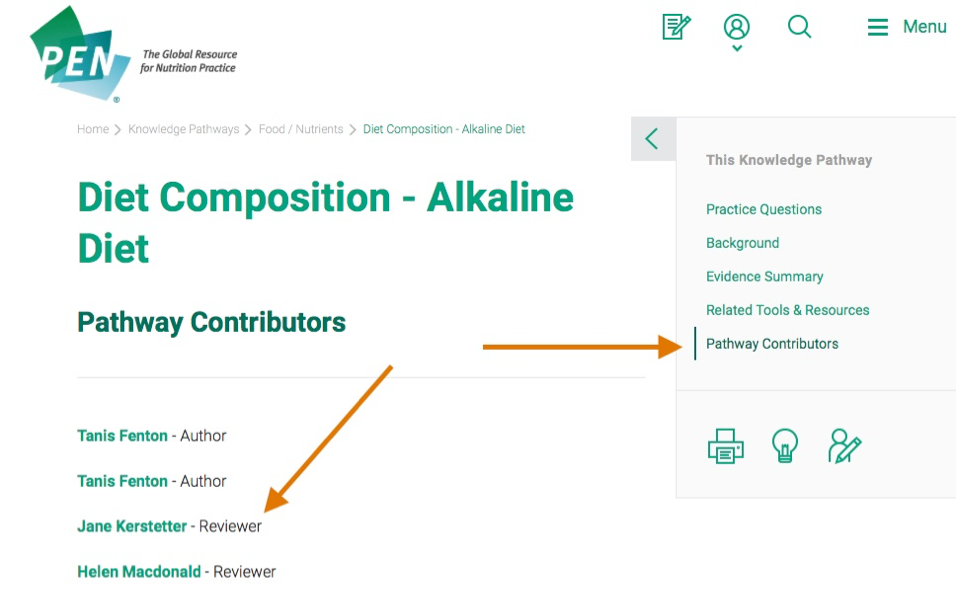
PEN also recognizes peer reviewers in PEN eNews when we thank our international volunteers for their peer review contributions to the PEN® content development process. In the PEN Content Management System (PCMS) reviewers receive a thank you letter for their contribution and they can obtain a letter of contribution to PEN over a period of time that they define. This letter can then be used to add to your professional, continuing education portfolio as most regulatory bodies recognize reviewer’s contributors to PEN. In addition to contributing to the PEN® System, peer review helps to expand our current knowledge, writing skills and encourages self-reflection of our own biases and assumptions.
References:
- Dietitians of Canada. Practice-based Evidence in Nutrition® PEN® Authors and Reviewers Guide. [accessed 2018 Apr. 2.] Available from: https://www.pennutrition.com/resources/PEN%20Writers%20Guide%20New%20March%2028%202015.pdf
This ia an updated article originally compiled by:
Kristyn Hall MSc, RD
Updated by:
Beth Armour M.Ed, RD
PEN®Content Manager
beth.armour@dietitians.ca
thank you to our PEN® volunteers
Our global PEN
® partnership has benefited from volunteer efforts around the world. Please take a moment to read and acknowledge your colleagues who have served as authors, or peer reviewers for PEN content since
April 2017.
Australia 
Melissa Adamski
Azmat Ali
Julie Ayre
Merrilyn Banks
Lina Breik
Leanne Brown
Teresa Brown
Rebecca Brynes
Julie Bujold
Annette Byron
Yvonne Coleman
Zoe Davidson
Claire Dux
Merran Findlay
Claire Gardiner
Kay Gibbons
Janelle Gifford
Jane Harrowfield
Gabriella Heruc
Christine Innes-Hugues
Phillip Juffs
Amanda Lowe
Michelle Minehan
Judy Nation
Merryn Netting
Laura O’Brien
Marie-Claire O’Shea
Emma Osland
Cynthia Porter
Liz Purcell
Megan Rebuli
Lynda Ross
Belinda Steer
Angela Vivanti
Evelyn Volders
Jacki Walker
Fiona Willer
Olvia Wright
Adrienne Young
South Africa 
Mariette Abrahams
Lindsay Archiblad-Durham
Kelly Francis
Cavlin Goodchild
Janetta Harbron
Radha Joshi
Stuart Kaptein
Glenrose Manale
Germany
Peter Konturek
United Kingdom 
Heather Browne
Gaynor Bussell
Tom Butler
Alethea Donnelly
Lucy Gardner
Yvonne Jeanes
Alsion Jowett
Sherly Li
Yvonne MacKenzie
Sally Moore
Sally Thomas
Want to see your name amongst dietetics thought leaders from around the world? Become a PEN® author or reviewer! Please click here to send us your contact information.
Canada 
Jennifer Adolphe
Ohood Alharbi
Dawn Belland
Phylicia Beneby
Jessica Bertrand
Rebecca Blair
Nicole Bloschinsky
Paula Brauer
Andrea Buchholz
Margaret Brum
Alexandra Carambelas
Carla D'Andreamatteo
Andrea Firmin
Chelsia Gillis
Vanessa Gilmor
Helen Haresign
Rebecca Hanemaayer
Brenda Hartman
Lydia Hayward
Mary Hendrickson-Nelson
Coralee Hill
Jennifer House
Paola Hunter
Tracy Hutchings
Sarah Kelly
Catherine Kernaghan
Gwen Kostal
Peter Lam
Irene Laskowski
Barb Leslie
Ryna Levy-Milne
Kwan Yu Li
Xiangrui Li
Zhijun Liu
Michele MacDonald Werstuck
Janet Madill
Diane Mager
Daniela Malta
Dharmabir Mann
Christine Mehling
Jill Morris
Carley O’Kane
Jessica Patlan
Jess Pirnak
Mary Rabahi
Mohamed Rezk
Susan Roberts
Veronica Rouse
Jessica Salomon
Bethany Staubitz
Stephanie Suski
Melissa Tambeau
Carole Tranchant
Teresa Tsui
Caroline Tuck
Pat Vanderkooy
Kaitlyn Vanderleest
Ningying Wang
Susan Ward
Sara Michelle Weinman
Leslie Whittington-Carter
Elaine Wu
Kitty Yung
New Zealand 
Frances Arenhold
Lisa Daniels
"Guaranteed to be a great learning and networking experience"
PEN® Insider
Spotlight on PEN at the 35th Dietitians Association of Australia National Conference in Sydney, Australia

In the last issue of PEN eNews, we shared details of the upcoming Dietitians Association of Australia (DAA) National Conference, 17-19 May 2018! The theme is ‘Think Big’ and PEN, as an innovative knowledge translation tool, is a perfect fit within this theme – featuring a number of times in the program.
We’re thrilled to be holding two PEN-specific workshops co-ordinated by DAA’s PEN Translational Research Leader, Associate Professor Judy Bauer (FDAA) along with other key members.
Evidence-based practice: Introduction to the GRADE system of evaluating evidence: Friday 18 May 2018 (A/Prof Judy Bauer, Dr Vasant Hirani and Juliana Chen (PhD Scholar), University of Sydney). PEN has committed to using the GRADE approach and this workshop is designed for dietitians and students wanting to learn more about the GRADE system of evidence analysis and its application to dietetics practice.
PEN, the global resource for Evidence Based Nutrition Practice – 10 Tips and tools to Power your Practice: Saturday 19 May 2018 (A/Prof Judy Bauer, Natalie Stapleton DAA) PEN is such a versatile tool that can be used across many practice areas, and this workshop will provide dietitians and students with an insight into how to use PEN and how it can be benefit their practice.
Also, at the conference, the 2017 PEN Prize Winner will be presented as part of the awards sessions. Keep an eye on future editions to find out more about this well deserving recipient!
The PEN Australia team will be attending the Sydney conference and speaking with delegates about PEN and its features. If you’re attending please come along and say hello to the PEN Australia team at the DAA stand in the trade exhibition area.
For further information on the 35th DAA National Conference or to register, visit daa2018.com.au.
Written by:
Natalie Stapleton APD
Manager Professional Services
Dietitians Association of Australia
"The PEN team will be by the Registration desk"
PEN® Insider
Spotlight on PEN at the Dietitians of Canada national conference: Elevate, Influence and Inspire. June 6 – 9, 2018
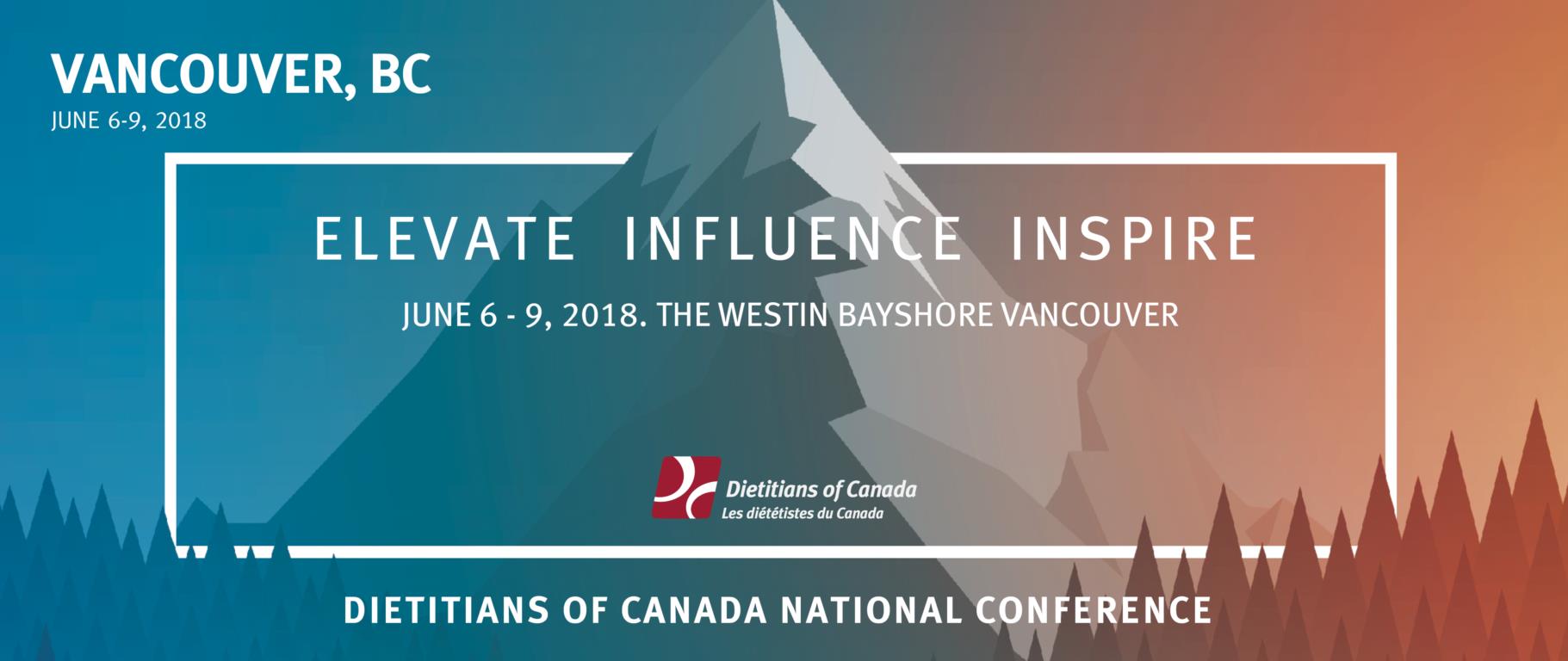
Hosted in beautiful Vancouver British Columbia, the DC National Conference aims to help you Elevate your practice, learn how to effectively Influence others, and Inspire you to grow and thrive in your profession. The conference offers 3 days of workshops, lectures, and tours sure to interest dietitian-nutritionists in all areas of practice. With over 30 concurrent sessions, 6 local tours, a variety of plenary lectures and symposia, the Conference and offers diverse learning opportunities from esteemed subject matter experts from across North America (and Australia!) speaking on topics covering the art and the science of dietetics. Special programming is offered this year for students or those in the first 3 years of practice. In addition, many specialty practice area Networks will be hosting evening social events, providing you the opportunity to meet and connect with colleagues interested in your areas of practice. Of course, the PEN team will be there hosting a booth and a session: Hot topics in everyday practice. Join our three speakers who will provide a succinct summary of the issue, the evidence, the hype and the practice recommendations related to leaky gut, nutritional genomics and genetically modified foods. We’ll also announce this year’s PEN Achiever Award winner!
Early Bird Registration Deadline: April 23, 2018.
Learn more
PEN eNews
April 2018 Volume
7 (5)
A Publication of the PEN® System Global Partners,
a collaborative partnership between International Dietetic Associations.
Learn more about PEN.
Copyright Dietitians of Canada
. All Rights Reserved.